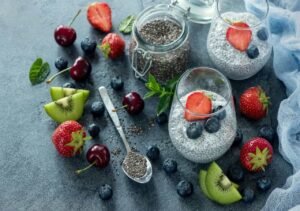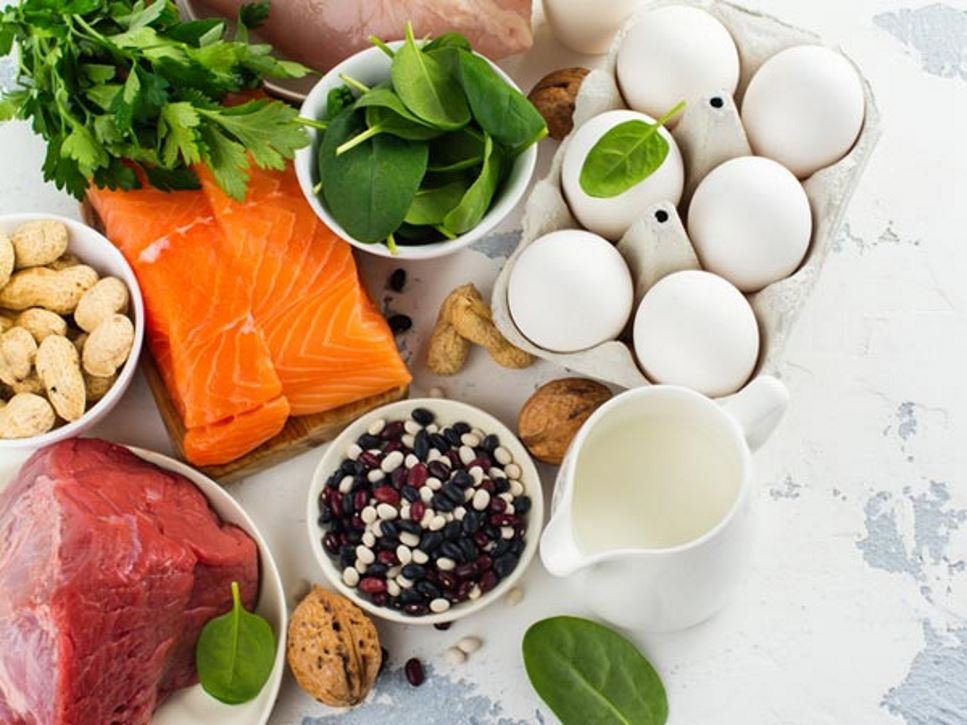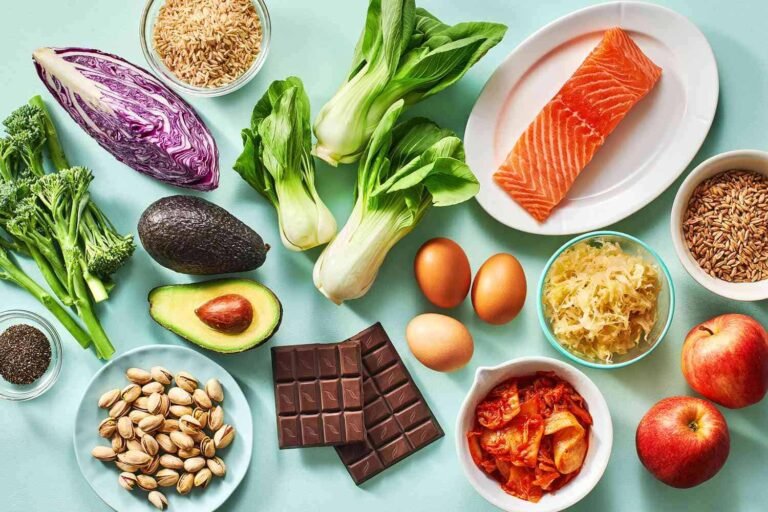5 Superfoods to Include in Your Healthy Diet Plan
In recent years, the concept of “superfoods” has gained popularity in the world of nutrition. These foods are celebrated for their exceptional nutrient density and health benefits. While there is no official definition of a superfood, they are generally understood to be foods that provide a wealth of vitamins, minerals, and antioxidants, which are crucial for maintaining optimal health. By incorporating superfoods into your diet, you can support your immune system, improve your overall well-being, and even lower your risk of chronic diseases.
Here are five superfoods you should consider adding to your healthy diet plan:
1. Blueberries: The Antioxidant Powerhouse
Blueberries are often referred to as a “superfruit” because of their rich concentration of antioxidants, particularly anthocyanins, which give the berries their deep blue color. Antioxidants help neutralize free radicals, which are unstable molecules that can damage cells and contribute to aging and diseases such as cancer.
Health Benefits:
- Boosts brain health: Several studies suggest that consuming blueberries regularly can improve memory and slow age-related cognitive decline. This is particularly beneficial for preventing diseases like Alzheimer’s.
- Heart health: Blueberries have been shown to lower blood pressure and reduce LDL cholesterol (the “bad” cholesterol), which are key risk factors for heart disease.
- Supports healthy digestion: Blueberries are a good source of dietary fiber, aiding in digestion and preventing constipation.
- Regulates blood sugar: Despite their sweetness, blueberries have a low glycemic index, meaning they won’t cause significant spikes in blood sugar. This makes them an excellent option for individuals with diabetes or those aiming to prevent blood sugar fluctuations.
How to Add Blueberries to Your Diet:
- Toss them into your morning oatmeal or yogurt.
- Add them to smoothies for a burst of flavor and nutrition.
- Eat them as a snack or add them to a salad for a sweet touch.
2. Kale: The Nutrient-Dense Green
Kale is a leafy green vegetable often touted as one of the most nutrient-dense foods on the planet. Packed with vitamins, minerals, and antioxidants, kale provides a variety of health benefits that can support everything from your immune system to your bone health.
Health Benefits:
- Rich in vitamins: Kale is high in vitamins A, C, and K. Vitamin K is essential for blood clotting and bone health, while vitamin C boosts the immune system and promotes skin health. Vitamin A is crucial for maintaining healthy vision.
- Anti-inflammatory properties: Kale contains compounds like quercetin and kaempferol, which have been shown to have anti-inflammatory effects, potentially reducing the risk of chronic inflammatory diseases such as arthritis.
- Supports detoxification: Kale is rich in glucosinolates, which aid in the detoxification process by helping the liver eliminate toxins.
- Bone health: The high calcium content in kale makes it a valuable plant-based option for supporting strong bones, particularly for those who do not consume dairy.
How to Add Kale to Your Diet:
- Use it as a base for salads or mix it with other greens.
- Blend it into green smoothies with fruits like apples and bananas.
- Sauté kale with garlic and olive oil for a nutritious side dish.
3. Chia Seeds: The Omega-3 and Fiber Source

Chia seeds might be small, but they pack a powerful nutritional punch. These tiny seeds are loaded with fiber, omega-3 fatty acids, and various micronutrients, making them a fantastic addition to a healthy diet.
Health Benefits:
- High in fiber: Just one ounce of chia seeds contains 11 grams of fiber, which is about a third of the recommended daily intake. This makes chia seeds an excellent food for improving digestion, promoting regular bowel movements, and supporting weight management by keeping you fuller for longer.
- Omega-3 fatty acids: Chia seeds are one of the richest plant-based sources of omega-3 fatty acids, which are essential for heart health. Omega-3s help reduce inflammation and lower the risk of heart disease by improving cholesterol levels.
- Strong bones: Chia seeds are a good source of calcium, phosphorus, and magnesium, all of which are important for bone health. In fact, gram for gram, chia seeds contain more calcium than most dairy products.
- Blood sugar regulation: The fiber and healthy fats in chia seeds help slow the absorption of sugar in the bloodstream, which can help maintain steady blood sugar levels and prevent spikes after meals.
How to Add Chia Seeds to Your Diet:
- Stir them into yogurt or oatmeal for added texture and nutrition.
- Make chia seed pudding by soaking them in almond milk or coconut milk overnight.
- Add them to smoothies or sprinkle them on salads for a crunchy topping.
4. Salmon: The Protein-Packed Superfood

Salmon is one of the best sources of high-quality protein and omega-3 fatty acids, particularly EPA and DHA, which are known to support heart health, brain function, and reduce inflammation throughout the body. Whether wild-caught or farmed, incorporating salmon into your diet can provide several key nutrients.
Health Benefits:
- Rich in omega-3s: The omega-3 fatty acids in salmon play a critical role in reducing inflammation, lowering blood pressure, and decreasing the risk of heart disease. They are also essential for brain health, improving memory, and reducing the risk of cognitive decline as you age.
- Excellent source of protein: Protein is essential for repairing tissues, building muscle, and maintaining a healthy immune system. Salmon provides about 22-25 grams of protein per 3.5-ounce serving, making it an excellent choice for those looking to increase their protein intake.
- Supports eye health: The omega-3s and antioxidants found in salmon can also help protect against age-related macular degeneration, a leading cause of vision loss in older adults.
- Boosts mood: There is evidence suggesting that regular consumption of omega-3-rich foods like salmon can help alleviate symptoms of depression and anxiety.
How to Add Salmon to Your Diet:
- Grill or bake salmon fillets with herbs and spices for a delicious and nutritious dinner.
- Add smoked salmon to salads, sandwiches, or scrambled eggs.
- Include canned salmon in recipes like salmon patties or pasta dishes for a more affordable option.
5. Quinoa: The Protein-Rich Grain

Quinoa is often referred to as a “supergrain” because of its impressive nutrient profile. It’s a complete protein, meaning it contains all nine essential amino acids that the body cannot produce on its own. This makes quinoa a fantastic plant-based protein source for vegetarians and vegans.
Health Benefits:
- Complete protein: Unlike most plant-based foods, quinoa is a complete protein, making it an ideal option for those looking to boost their protein intake without relying on animal products. It provides about 8 grams of protein per cup of cooked quinoa.
- Rich in essential minerals: Quinoa is a good source of magnesium, potassium, iron, and zinc, which are important for various bodily functions, including muscle function, maintaining healthy blood pressure, and immune support.
- Gluten-free: Quinoa is naturally gluten-free, making it a great choice for people with celiac disease or gluten intolerance.
- Supports heart health: Quinoa is high in antioxidants, which can help protect against oxidative stress and reduce the risk of heart disease. The fiber content in quinoa also helps to lower cholesterol levels.
How to Add Quinoa to Your Diet:
- Use quinoa as a base for salads or grain bowls.
- Substitute quinoa for rice or pasta as a healthier side dish.
- Cook it with milk and cinnamon for a nutritious breakfast porridge.
Conclusion
Incorporating these five superfoods—blueberries, kale, chia seeds, salmon, and quinoa—into your diet can significantly enhance your overall health and well-being. Each of these foods is packed with unique nutrients that support various aspects of health, from brain function and heart health to digestion and bone strength. By diversifying your diet and including these superfoods, you can provide your body with the essential vitamins, minerals, and antioxidants it needs to thrive. Whether you’re looking to improve your immune system, protect your heart, or simply feel more energetic, these superfoods offer an easy and delicious way to take your nutrition to the next level.





